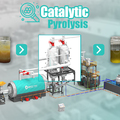Introduction
Plastic waste management is a critical issue confronting Europe today. With the burgeoning consumption of plastic products, the continent faces significant environmental and economic challenges. Effective plastic recycling programs are essential to mitigate these issues. One promising method is plastic pyrolysis, which transforms plastic waste into valuable resources. This article explores the importance of establishing comprehensive plastic recycling programs in Europe, with a particular focus on the role of plastic pyrolysis.
Environmental Imperatives
Plastic pollution is ubiquitous, affecting terrestrial and marine ecosystems. Conventional waste disposal methods, such as landfilling and incineration, exacerbate environmental degradation. Landfills occupy vast tracts of land, leach harmful chemicals into the soil, and emit methane, a potent greenhouse gas. Incineration, while reducing waste volume, releases toxic emissions, including dioxins and furans, which pose severe health risks.
Recycling plastic waste can significantly reduce these environmental impacts. By diverting plastic from landfills and incinerators, recycling programs help conserve natural resources, reduce greenhouse gas emissions, and minimize pollution. Plastic pyrolysis, in particular, offers an environmentally friendly solution by converting waste into reusable materials, such as fuel, thus closing the loop on plastic production and consumption.
Economic Benefits
Establishing robust plastic recycling programs also yields substantial economic benefits. The recycling industry creates jobs and stimulates economic growth. For instance, collecting, sorting, and processing plastic waste generates employment opportunities across the supply chain. Moreover, recycling conserves resources, reducing the need for virgin materials and lowering production costs for manufacturers.
Plastic pyrolysis technology is especially advantageous economically. This technology transforms plastic waste into pyrolysis oil, which can be refined into diesel, gasoline, or used as a feedstock for new plastic production. By creating a market for recycled plastic products, plastic pyrolysis incentivizes waste collection and processing, fostering a circular economy where materials are reused rather than discarded.
Technological Advancements
Technological innovation is at the heart of modern plastic recycling programs. Advances in sorting technologies, such as near-infrared (NIR) spectroscopy and artificial intelligence (AI), enhance the efficiency and accuracy of plastic waste sorting. These technologies enable the separation of different types of plastics, ensuring high-quality feedstock for recycling processes.

Plastic pyrolysis represents a significant technological breakthrough. The process involves heating plastic waste in the absence of oxygen, breaking down long polymer chains into smaller molecules. This thermal decomposition produces pyrolysis oil, along with gas and char. The oil can be refined into various products, while the gas can be used to generate energy, making the process self-sustaining. The char, rich in carbon, has applications in construction and agriculture.
Policy and Regulation
Effective plastic recycling programs require supportive policy frameworks and stringent regulations. The European Union has implemented several directives and regulations aimed at promoting plastic recycling and reducing waste. The EU's Circular Economy Action Plan, for example, sets ambitious targets for plastic recycling and mandates the reduction of single-use plastics.
Member states must adopt and enforce these policies to ensure compliance. Financial incentives, such as subsidies and tax breaks for recycling facilities, can encourage investment in recycling infrastructure. Additionally, public awareness campaigns can educate citizens about the importance of recycling and proper waste segregation.
Social Responsibility and Consumer Behavior
Public participation is crucial for the success of plastic recycling programs. Consumers play a vital role in the waste management chain by segregating recyclables and reducing plastic consumption. Social responsibility campaigns can raise awareness about the environmental impacts of plastic waste and encourage sustainable behavior.
Educational programs in schools and communities can instill recycling habits from a young age. Moreover, businesses can contribute by adopting sustainable practices, such as using recycled materials and designing products for easier recycling. Corporate social responsibility (CSR) initiatives can further enhance a company's reputation and customer loyalty.
Challenges and Solutions
Despite the clear benefits, establishing effective plastic recycling programs in Europe faces several challenges. One major issue is the heterogeneous nature of plastic waste. Different types of plastics have varying recycling processes and economic values, complicating the sorting and processing stages.
Plastic pyrolysis offers a solution to this challenge. Unlike mechanical recycling, which requires clean and sorted plastics, Beston plastic pyrolysis plant can handle mixed and contaminated plastics. This flexibility makes it a versatile option for managing diverse plastic waste streams. However, the technology is capital-intensive, and scaling up production requires substantial investment and infrastructure development.
Another challenge is the market for recycled plastic products. Recycled plastics often face competition from cheaper virgin materials, limiting their market penetration. Policies that mandate recycled content in products and packaging can create a stable demand for recycled plastics, ensuring the viability of recycling programs.
Future Prospects
The future of plastic recycling in Europe looks promising, with ongoing technological advancements and increasing policy support. The European Green Deal aims to make Europe the first climate-neutral continent by 2050, and plastic recycling is a key component of this vision. Investments in recycling infrastructure, coupled with innovations in plastic pyrolysis, will play a crucial role in achieving these targets.
Moreover, international collaboration can enhance the effectiveness of plastic recycling programs. Sharing best practices, technologies, and resources can help countries overcome common challenges and achieve collective goals. The global nature of plastic pollution necessitates a coordinated response, and Europe can lead the way by setting high standards and fostering cooperation.





